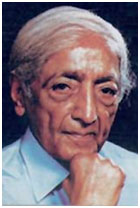 |
KRISHNAMURTI TO HIMSELF: HIS LAST JOURNAL
By J. Krishnamurti
 There is a tree by the river, and we have been watching it day after day for several weeks when the sun is about to rise. As the sun rises slowly over the horizon, over the trees, this particular tree becomes all of a sudden golden. All the leaves are bright with life, and as you watch it as the hours pass by, that tree whose name does not matter-what matters is that beautiful tree-an extraordinary quality seems to spread all over the land, over the river. And as the sun rises a little higher, the leaves begin to flutter, to dance. And each hour seems to give to that tree a different quality. Before the sun rises it has a sombre feeling, quiet, far away, full of dignity. And as the day begins, the leaves with the light on them dance and give it that peculiar feeling that one has of great beauty. By midday its shadow has deepened, and you can sit there protected from the sun, never feeling lonely, with the tree as your companion. As you sit there, there is a relationship of deep abiding security and a freedom that only trees can know.
Towards the evening when the western skies are lit up by the setting sun, the tree gradually becomes sombre, dark, closing in on itself. The sky has become red, yellow, green, but the tree remains quiet, hidden, and is resting for the night.
If you establish a relationship with it, then you have relationship with mankind. You are responsible then for that tree and for the trees of the world. But if you have no relationship with the living things on this earth, you may lose whatever relationship you have with humanity, with human beings. We never look deeply into the quality of a tree; we never really touch it, feel its solidity, its rough bark, and hear the sound that is part of the tree. Not the sound of wind through the leaves, not the breeze of a morning that flutters the leaves, but its own sound, the sound of the trunk and the silent sound of the roots. You must be extraordinarily sensitive to hear the sound. This sound is not the noise of the world, not the noise of the chattering of the mind, not the vulgarity of human quarrels and human warfare, but sound as part of the universe.
It is odd that we have so little relationship with nature, with the insects and the leaping frog and the owl that hoots among the hills, calling for its mate. We never seem to have a feeling for all living things on the earth. If we could establish a deep abiding relationship with nature we would never kill an animal for our appetite, we would never harm, vivisect a monkey, a dog, a guinea pig for our benefit. We would find other ways to heal our wounds, heal our bodies. But the healing of the mind is something totally different. That healing gradually takes place if you are with nature, with that orange on the tree, and the blade of grass that pushes through the cement, and the hills covered, hidden, by the clouds.
This is not sentiment or romantic imagination but a reality of a relationship with everything that lives and moves on the earth. Man has killed millions of whales and is still killing them. All that we derive from their slaughter can be had through other means. But apparently man loves to kill things, the fleeting deer, the marvellous gazelle and the great elephant. We love to kill each other. This killing of other human beings has never stopped throughout the history of man's life on this earth. If we could-and we must-establish a deep long-abiding relationship with nature, with the actual trees, the bushes, the flowers, the grass and the fast moving clouds, then we would never slaughter another human being for any reason whatsoever. War is organized murder, and though we demonstrate against a particular war, the nuclear, or any other kind of war, we have never demonstrated against war itself. We have never said that to kill another human being is the greatest sin on earth.
|
 |